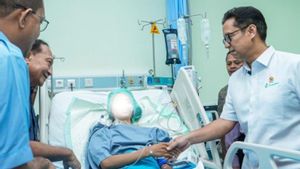JAKARTA - The Ministry of Cooperatives and Micro, Small, and Medium Enterprises (MSMEs) estimates that by 2021 there will be more than 64 million MSMEs in Indonesia. While the World Economic Forum notes, in 2022 MSMEs have created jobs for more than 100 million workers, with nearly 65 percent of them being women.
Furthermore, between 2017 and 2020, the share of women entrepreneurs involved in online trading (e-commerce) has tripled. The pandemic has accelerated the adoption of digital and e-commerce business models by women-owned businesses.
A survey by the SMERU Research Institute found that more than 50 percent of women-owned companies increased their use of the internet during and after the pandemic. Furthermore, as highlighted by the World Bank's 2021 digitization report, almost 60 percent of female internet users who left their previous jobs due to pregnancy and childbirth are now working in the e-commerce sector.

This discussion became the main topic of the Women in the Digital Age webinar: Utilizing Digital Services for Business Growth, which was held to coincide with International Women's Day, March 8. This webinar was organized by the World Bank, in collaboration with Women's World Banking, and supported by the Australian Government.
Satu Kahkonen, World Bank Representative for Indonesia and Timor-Leste said in his remarks that the acceleration of digitalization opens up new and interesting opportunities for women entrepreneurs. "Online trading (e-commerce) opens opportunities for more women to enter the workforce and increases labor force participation in Indonesia. If participation increases to just 58 percent, then this can contribute as much as 62 billion
US dollar to the economy," he said in a release received by VOI, Saturday, March 11.
One then recommends four ways to maintain and increase those opportunities. First, build women's digital literacy and skills to be involved in the digital-based labor market. Second, designing digital technology and innovation that meets the needs of women and girls.
Third, increase the participation of women and girls in the fields of Science, Technology, Engineering, and Mathematics to ensure their role in developing technology, research, and digital investment for the future.
Fourth, encourage a balanced distribution of care responsibilities in the household and community environment, so that women can have more time and opportunities to be involved in income-earning work.
"This effort can help ensure a fair and equitable digital transition for all," added Satu.
SEE ALSO:
The Women's World Banking study also explains the benefits of adopting digital technology for the ultra-micro segment which is included in the MSME category, among other things, helping accelerate post-pandemic ultra-micro business recovery and increasing income. For MSMEs, technology can improve efficiency and operational capabilities.
Christina Maynes, Southeast Asia Regional Director, Women's World Banking said, “We believe digital access is an important step to ensure that women have the opportunity to develop their capabilities in digital finance, and this is the key for women to be confident and empowered through the use of digital financial services. .”
Furthermore, she conveyed three main points needed in forming digital transformation guidelines for Indonesian women from Women's World Banking namely, first, the need
designed training materials that focus on increasing digital financial literacy so that more women can use digital financial services with confidence.
Second, social encouragement to increase the number of women in managerial positions in financial services institutions and government agencies. Third, placing more female employees in the banking sector with the aim of facilitating fellow female customers.
The English, Chinese, Japanese, Arabic, and French versions are automatically generated by the AI. So there may still be inaccuracies in translating, please always see Indonesian as our main language. (system supported by DigitalSiber.id)















